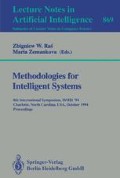Abstract
In this paper we analyze relationships between different forms of knowledge that can be discovered in the same data matrix (database): contingency tables, equations, concept definitions, and concept hierarchies. We argue for the basic role of contingency tables and equations (law-like knowledge), and for the limitations of concept hierarchies. We show how a subset of contingency tables which approximate logical equivalence can be used to construct concept hierarchies: (1) each of those regularities leads to an element of the conceptual hierarchy, (2) the elements are merged to increase their empirical contents, and (3) hierarchy elements are combined into concept hierarchy. The possibility of different hierarchies leads to the question of choice between hierarchies, for which we provide our optimality criterion. We illustrate our algorithm by an application on the soybean database, and we show how our results go beyond the results obtained by the COBWEB approach to clustering.
Preview
Unable to display preview. Download preview PDF.
References
Fisher, D.H. 1987. Knowledge Acquisition Via Incremental Conceptual Clustering Machine Learning 2 139–172.
Hoschka, P. & Klösgen, W. 1991. A Support System for Interpreting Statistical Data, in: Piatetsky-Shapiro G. & Frawley W. eds Knowledge Discovery in Databases, Menlo Park, CA: AAAI Press, 325–345.
Klösgen, W. (1992). Patterns for Knowledge Discovery in Databases in: ed Proceedings of the ML-92 Workshop on Machine Discovery (MD-92), Aberdeen, UK. July 4, p.1–10.
Langley, P., Simon, H. A., Bradshaw, G. L. & żytkow, J. M. 1987. Scientific discovery: Computational explorations of the creative processes. Cambridge, MA: MIT Press.
Michalski, R.S. & Chilausky, R.L. 1980. Learning by Being Told and Learning from Examples: An Experimental Comparison of the Two Methods of Knowledge Acquisition in the Context of Developing an Expert System for Soybean Disease Diagnosis, Int. J. of Policy Analysis and Info. Systems, 4, 125–161.
Nordhausen, B. & Langley, P. 1993. An Integrated Framework for Empirical Discovery, Machine Learning, 12, 17–47.
Piatetsky-Shapiro, G. & Matheus, C. 1991. Knowledge Discovery Workbench: An Exploratory Environment for Discovery in Business Databases, in Piatetsky-Shapiro ed. Proc. of AAAI-91 Knowledge Discovery in Databases Workshop, 11–24.
Shen, W. 1993. Discovery as Autonomous Learning from the Environment. Machine Learning, 12, 143–165.
Stepp, R.E. 1984. Conjunctive Conceptual Clustering: A methodology and experimentation, Ph.D. dissert., Dept. of Computer Science, Univ. of Illinois, Urbana.
Wu, Q., Suetens, P. & Oosterlinck, A. 1991. Integration of Heuristic and Bayesian Approaches in a Pattern-Classification System, in Piatetsky-Shapiro G. &. Frawley W. eds. Knowledge Discovery in Databases, Menlo Park, CA: AAAI Press, 249–260.
Zytkow, J., & Zembowicz, R., (1993) Database Exploration in Search of Regularities, Journal of Intelligent Information Systems, 2, p.39–81.
Author information
Authors and Affiliations
Editor information
Rights and permissions
Copyright information
© 1994 Springer-Verlag Berlin Heidelberg
About this paper
Cite this paper
Troxel, M., Swarm, K., Zembowicz, R., żytkow, J.M. (1994). Concept hierarchies: a restricted form of knowledge derived from regularities. In: Raś, Z.W., Zemankova, M. (eds) Methodologies for Intelligent Systems. ISMIS 1994. Lecture Notes in Computer Science, vol 869. Springer, Berlin, Heidelberg. https://doi.org/10.1007/3-540-58495-1_44
Download citation
DOI: https://doi.org/10.1007/3-540-58495-1_44
Published:
Publisher Name: Springer, Berlin, Heidelberg
Print ISBN: 978-3-540-58495-7
Online ISBN: 978-3-540-49010-4
eBook Packages: Springer Book Archive

